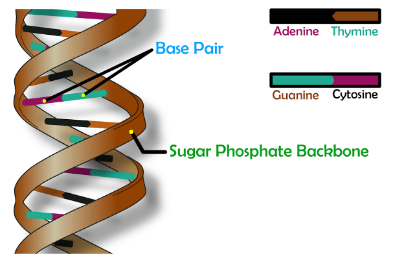
Write the importance of DNA.
Answer
524.7k+ views
Hint: DNA, which stands for Deoxyribonucleic acid, is a hereditary material in the organisms which defines the genetic characteristics of an organism and will respond to certain stimuli in the environment.
Complete answer:
The DNA is present in the chromosomes of every organism and is instrumental in defining the genetic characteristics of that individual. It is a vital part of any organism due to the following reasons:
1. It has the genetic information of an individual, which governs its physical as well as mental characteristics based on its parents.
2. The DNA studies are used by the scientists to find out the progeny and ancestry of an organism. It also helps them to find out the common ancestors of several organisms and group them together.
3. The DNA is instrumental in the life cycle of an individual as it is the DNA which enables the synthesis of several enzymes in the body from proteins, which are the building blocks of a cell.
4. Variation DNA defines if an organism will be able to survive in an adverse environment or not. In such cases, the more the variation in DNA, the more are the chances of survival for that organism.
5. When the cells divide on cell division, the entire DNA framework gets copied in mitosis division whereas in meiosis, only $50\%$ of the DNA framework is copied to the daughter cells.

Note:
The changes in the environment are responsible for the change in DNA of an organism. For example, the bacterial DNA gets altered when placed in boiling water due to which it perishes as similar cells cannot be formed from an altered DNA.
Complete answer:
The DNA is present in the chromosomes of every organism and is instrumental in defining the genetic characteristics of that individual. It is a vital part of any organism due to the following reasons:
1. It has the genetic information of an individual, which governs its physical as well as mental characteristics based on its parents.
2. The DNA studies are used by the scientists to find out the progeny and ancestry of an organism. It also helps them to find out the common ancestors of several organisms and group them together.
3. The DNA is instrumental in the life cycle of an individual as it is the DNA which enables the synthesis of several enzymes in the body from proteins, which are the building blocks of a cell.
4. Variation DNA defines if an organism will be able to survive in an adverse environment or not. In such cases, the more the variation in DNA, the more are the chances of survival for that organism.
5. When the cells divide on cell division, the entire DNA framework gets copied in mitosis division whereas in meiosis, only $50\%$ of the DNA framework is copied to the daughter cells.

Note:
The changes in the environment are responsible for the change in DNA of an organism. For example, the bacterial DNA gets altered when placed in boiling water due to which it perishes as similar cells cannot be formed from an altered DNA.
Recently Updated Pages
Master Class 11 Computer Science: Engaging Questions & Answers for Success

Master Class 11 Business Studies: Engaging Questions & Answers for Success

Master Class 11 Economics: Engaging Questions & Answers for Success

Master Class 11 English: Engaging Questions & Answers for Success

Master Class 11 Maths: Engaging Questions & Answers for Success

Master Class 11 Biology: Engaging Questions & Answers for Success

Trending doubts
One Metric ton is equal to kg A 10000 B 1000 C 100 class 11 physics CBSE

There are 720 permutations of the digits 1 2 3 4 5 class 11 maths CBSE

Discuss the various forms of bacteria class 11 biology CBSE

Draw a diagram of a plant cell and label at least eight class 11 biology CBSE

State the laws of reflection of light

Explain zero factorial class 11 maths CBSE




